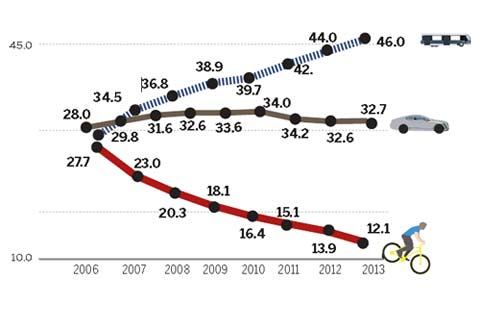Fairness of anti-trust can't be doubted
Updated: 2014-09-24 07:28
By Liu Hui(China Daily)
|
|||||||||||
There is nothing wrong with the government - central and local - offering some favorable policies and rules to attract foreign investors in order to boost economic development and introduce more advanced technologies and management expertise to the country. But beyond a certain point, such a practice contravenes the principle of "fair competition". In fact, "excessive use" of such policies by some local governments has widened the competition gap between foreign and domestic companies, with many foreign companies using their superiority over domestic enterprises in terms of funds, technology, management and brands to establish monopolies in the Chinese market.
Besides, taking advantage of their capability to manipulate the market, foreign companies have also abused their monopolistic status. Indeed, China has enacted and implemented a string of market laws and regulations since 1996, but they have a lot of loopholes because of the country's complicated economic and legal situations.
Many foreign companies have used these loopholes to evade China's market laws and indulge in illegal activities such as price fixing, limiting of resale prices and misusing IPR protection, which would have drawn severe penalties even in US and European markets. For example, to bypass China's regulation that forbids the entry of foreign investors into specific industries, some foreign companies and individuals have registered listed entities overseas to control domestic operators that can access these sectors. Of course, a company is branded a monopoly not because of its size or share of the market, but because of the way it uses its position in the market.
Some Western observers have also questioned the fairness of the anti-monopoly probes because no open hearings have been held or clarifications sought from the investigated foreign companies. They have also alleged that the investigated foreign enterprises are barred from hiring lawyers to fight their case or coerced into accepting penalties. If that were indeed the case, why so many foreign companies have been declared free of monopolistic traits after being probed by anti-trust agencies?
It is true that a number of foreign companies have been penalized for monopolistic activities since January 2013, but they account for only 10 percent of all those investigated since China implemented the Anti-Monopoly Law in 2008. The purpose of Chinese authorities is not to target companies based on their ownerships and parent countries, but to regulate the business environment.
The anti-trust probes are aimed at helping China promote mature market operations, abandon preferential policies for foreign companies and allow the market to play a more decisive role in resource distribution by setting up a truly efficient regulatory and sound legal system.
The author is an assistance research fellow with the Institute of American Studies, Chinese Academy of Social Sciences.
Related Stories
11 Japanese firms fined for antitrust violation 2014-09-18 14:02
ABB supports nation's antitrust drive, top executive says 2014-09-18 07:31
China's antitrust probes not selective: NDRC 2014-09-12 09:20
'Antitrust probes aim to ensure market transparency and rights of consumers' 2014-09-02 07:20
Today's Top News
President Xi reassures HK of stability
Russia taps China for meat
China vows $6m for climate plan
Should Beijing help fight IS?
Let Mideast people solve their region's problems
Iraq situation demands China to engage
Ukrainian troops, rebels start creating buffer zone
China, US seek ways to benefit from carp
Hot Topics
Lunar probe , China growth forecasts, Emission rules get tougher, China seen through 'colored lens', International board,
Editor's Picks

|

|

|

|

|

|





